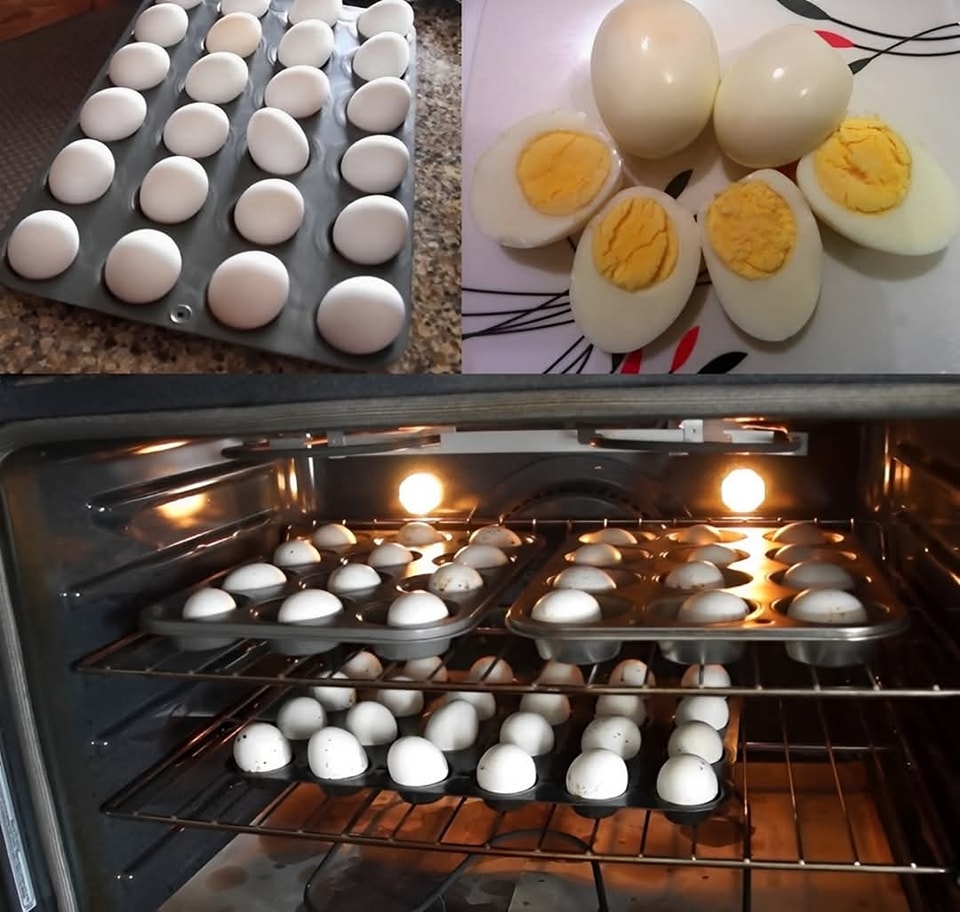If you’ve spent any time in the kitchen, chances are you’ve boiled more than a few eggs—and likely dealt with the occasional headache of peeling them or finding that dreaded green ring around the yolk. Maybe you’ve even walked away for “just a second” and come back to water boiling over. Been there, done that. So when I stumbled across the idea of baking hard-boiled eggs in the oven, I was skeptical but intrigued. It seemed strange at first—who bakes eggs in their shell?

But since I’m all about making things easier, I gave it a shot, and to my surprise, it actually works. Now the real question is: is this method better than the classic stovetop version? Let’s walk through it. Baking hard-boiled eggs in the oven might sound unconventional, but it’s incredibly simple. There’s no water to boil, no need to watch the clock, and minimal cleanup. All you need are eggs, a muffin tin or a baking dish, and a bowl of ice water. First, preheat your oven to anywhere between 325°F and 350°F. Since oven temperatures vary, you might need to experiment to find the sweet spot. Place each egg in a muffin tin slot to keep them from rolling around, or put them directly on the oven rack if you’re feeling brave. Bake them for 25 to 30 minutes, then immediately transfer them into a bowl of ice water for 5 to 10 minutes.
This cool-down step is essential—it stops the cooking process and helps make peeling the shells easier. Once cooled, you can peel and enjoy them right away, or store them in the fridge for up to a week. Just know that peeled eggs are best eaten within three to four days for peak freshness. So, what are the pros and cons of baking versus boiling? On the plus side, you can set it and forget it—no babysitting a pot, no risk of water boiling over. It’s also great for making large batches of eggs, whether you’re meal-prepping or getting ready for a picnic. Some folks say the eggs peel more easily, and there’s less chance of them cracking during the cooking process compared to boiling. But there are some trade-offs. Baking takes longer—around 25 to 30 minutes compared to about 10 to 12 minutes on the stove. Plus, the results can vary depending on how evenly your oven heats. You might find brown spots on the eggshells from the oven racks, and overbaking can lead to rubbery egg whites.
Taste-wise, oven-baked eggs are slightly different. The whites tend to be firmer, and the yolks can dry out a bit if overcooked. The real issue is the potential for overcooking, which can cause that unattractive green ring around the yolk. This discoloration is just a harmless chemical reaction between the sulfur in the whites and the iron in the yolks, but it’s definitely not pretty. Now let’s talk about the bane of many breakfast lovers’ existence—peeling. Peeling hard-boiled eggs can either be effortless or an exercise in frustration.
Some people swear that oven-baked eggs are easier to peel, but the truth is, it really comes down to the age of the eggs. Older eggs are just easier to peel, period. That holds true whether you bake them or boil them. So if you want to make peeling easier, try using eggs that are at least a few days old and consider shaking them in a container after cooking to loosen the shells. So, should you ditch the stovetop and make your hard-boiled eggs in the oven from now on? That depends on what matters most to you. If you’re cooking for a crowd or just love the convenience of a hands-off method, baking is definitely worth trying. But if speed and consistency are your priorities, the good old stovetop method still reigns supreme. Personally, I stick to boiling eggs when I only need a few, but when I’ve got a big batch to prepare, the oven becomes my best friend. In the end, either method gets the job done—as long as the eggs are cooked to perfection and easy to peel, you’ve got yourself a win in the kitchen.





